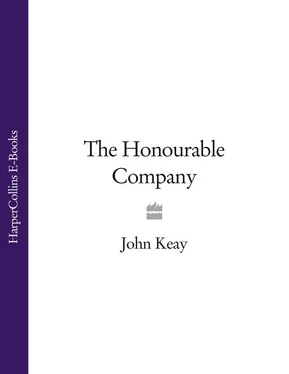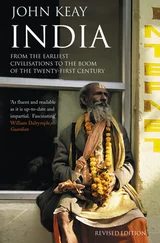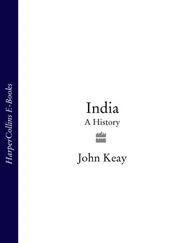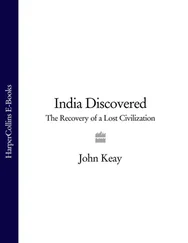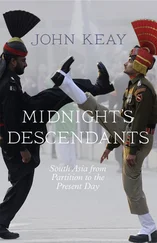Putting into Table Bay and St Augustine’s Bay (Madagascar) the youngest Middleton took just eight months from Tilbury to Bantam. There the indestructible Towerson had taken over as chief factor, Scot having returned with Henry Middleton. ‘We found the merchants in verie good health and all things in order’, noted David Middleton. Unlike his brother, he would invariably find things in order and he would make a point of leaving them so.
Continuing east he reached Tidore in early January 1608 and again found a pleasant surprise. The Portuguese had received assistance from their Spanish allies in the Philippines and had thus managed to evict the Dutch and their Ternate friends. Not that this made the English any more welcome. Again they were expected ‘to do, or seeme to doe, some piece of service’ – like sailing against the Dutch – ‘which our Captain absolutely refused, being against his commission’. Trading rights were therefore withdrawn and hence that necessity for ‘privie trade by night’. By the time they were ordered to sea the Consent had obtained perhaps half a loading of cloves.
She sailed south-west for one of Sulawesi’s (Celebes) many tentacles and there established excellent relations with the rulers of Butung and Kabaena. These two islands, though densely forested, produced no spices. However, like Macassar on Sulawesi’s next tentacle, they were of considerable importance as free ports and safe harbours in the native trade of the Archipelago. At Butung, or ‘Button’, where the king threw a series of memorable parties, Middleton found a Javanese vessel laden with cloves which her skipper readily sold to the English. Evidently such local craft stood a much better chance of sneaking spices past the Dutch than did an English vessel. Moreover, with Sulawesi dominated by Malays and Bugis, the most formidable seafarers and warriors in the whole archipelago, there was no danger of the Dutch coming in hot pursuit. Here then was a weak spot at which the Dutch monopoly might be dented without inviting hostilities. Middleton resolved to return to Butung, and the Company would soon be posting a factor to Macassar.
On 2 May 1608, with a three-gun salute to the jolly king of ‘Button’, the Consent, now fully laden, sailed for Bantam and home. She reached England in six months, another notably fast voyage, and her cargo of cloves, purchased for less than £3000, sold for £36,000. Three months later, in command of the much larger Expedition, David Middleton was again sailing for Butung.
Off Bantam he narrowly missed making the acquaintance of Captain Keeling, commander of the Third Voyage. This was the dilatory fleet, now at last homeward bound, with which David Middleton was supposed to have sailed on the previous voyage. ‘He passed us in the night,’ reported Keeling who must by now have been having serious doubts about the chimerical Middleton, ‘else we should surely have seene him.’
As usual Middleton was crowding on the sail. He spent just ten days at Bantam and by the New Year of 1610 was again bearing down on Butung. Its king had promised to lay in stocks of cloves, nutmegs and mace, and he had been as good as his word. But as he now explained amidst convulsions of grief, the whole lot had just been burnt along with his palace and ‘sundry of his wives and women’. The jolly king was anything but jolly and was now committed to a war with one of his neighbours. There could be no guarantee of a cargo here; Middleton therefore determined to try his luck elsewhere.
From the Bandas the news was not good. Keeling had been there and had left word of his reception with the factors at Bantam who had duly informed Middleton. Evidently the Dutch were losing patience with both the Bandanese and the English. One of their fleets numbering no less than thirteen ships had anchored off Neira and proceeded to land troops, erect forts, and cajole the bemused Bandanese into signing away the bulk of their produce exclusively to the V.O.C. Keeling in high dudgeon had been forced to withdraw to the outermost islands of Ai and Run. ‘Sixtie-two men against a thousand or more could not perform much’, he explained. He had defiantly left representatives on Ai and Run, but basically the English were relegated to their usual role of spectators as the Dutch doggedly pursued their monopolistic ambitions.
On the whole Middleton preferred not to try the Bandas. But in the event he had no choice; the usual alternative of a foray to Tidore for cloves was precluded by adverse winds. He therefore resolved on one last bid to establish the Company’s right to a share of the nutmeg market. Feigning that sublime confidence that was his hallmark, he approached the Dutch shipping at Neira ‘with flagge and ensigne [flying] and at each yard arm a pennant in as comely a manner as we could devise’. The Dutch were unmoved. There was no trade here but for ships of the V.O.C. They rejected his argument that ‘it were not good’ for nations that were friends in Europe to be ‘enemies among the heathen people’, they refused his offer of a bribe, and they were unimpressed by a sight of his royal commission. More words were exchanged, ‘some sharpe, some sweete’ according to Middleton, yet all to no avail. He was ordered back to sea. Complying in all but spirit, he gave the fortress at Ambon a wide berth and set up base a day’s sailing from the Bandas on the little-frequented island of Ceram.
For if the Dutch were anxious to see him off, the Bandanese were no less anxious to have him trade with them. In particular the outlying islands of Run and Ai were still resisting the ‘frothy’ Hollanders and saw the English as their natural allies. Middleton, ‘knowing well that in troubled waters it is good fishing’, set about frustrating the Dutch blockade by improvising a bizarre fleet to ply back and forth between the Bandas and the Expedition in her safe haven on Ceram. There was the Hopewell, his pinnace, which alone made nine trips, and the Middleton, a chartered junk which jauntily sailed amongst the Dutchmen. Then there was the Diligence, a resurrected barque which did her best, and finally a six-oared skiff which came to grief in a typhoon off the coast of Ceram.
Amongst the skiff’s castaways was Middleton himself. Washed ashore, he managed to evade Ceram’s supposed cannibals as he made his way back to base. He must have been almost there when, attempting to swim an alligator-infested river, he was swept out to sea and battered on the rocks ‘till neere hand drowned’; for ‘every suffe washed mee into the sea againe’. He was eventually hauled to safety clinging to a long pole. ‘After resting a reasonable space’, he declared himself fit ‘to the amazement of all my company.’
Six months of such scrapes, and as many near disasters at the hands of the Dutch, found the Expedition crammed with spices and a sufficient surplus to fill the Middleton and another still larger junk. Leaving men on Ai to complete the lading of the latter, Middleton sailed for Bantam and home, reaching London in the summer of 1611. His two voyages, the Company’s Third (which included Keeling’s ships) and Fifth, were financed by the same subscribers. In effect, as with the First and Second Voyages, investors in the Third had been obliged to reinvest in the Fifth. But confidence in the trade, which had reached such a low ebb at the end of the Second Voyage that ‘most of the members were inclined to wind up their affairs and drop the business’, was now reviving. For whereas the combined profit on the first two voyages had come to 95 per cent, that on the Third and Fifth was put at 234 per cent.
What these figures represented in terms of an annual rate of return on investment is difficult to calculate. Each stock took many years to sort out, dividends – like subscriptions – being paid in instalments. Thus 95 per cent over as much as eight years represented no great improvement on standard rates of interest then prevailing. But 234 per cent over a similar period was a much more exciting prospect. The Third and Fifth voyages represent a turning point in the infant Company’s fortunes. David Middleton had demonstrated that the high-value trade in nutmegs, mace and cloves was not yet lost to the Company; Keeling’s fleet, as will be seen, had located a source of calicoes in India with which to pay for them; and thanks to better arrangements for re-export to European markets, even pepper was looking a more attractive prospect.
Читать дальше
